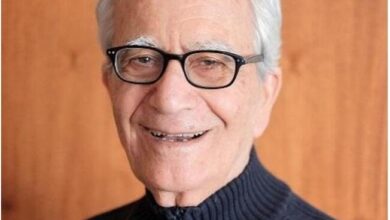
The Arabs and the stage of wandering.- -the story of the meeting that brought me together with the late Syrian Arab philosopher and thinker Dr. Elias Farah
by Dr. Riyad El Aissami
While I was in retreat with myself reviewing the situation in Syria and the reality of the Arabs today in light of Israel’s unchecked incursion, not even voices of protest, I remembered the story of the meeting that brought me together in Washington with the Syrian Baathist Arab philosopher and thinker Dr. Elias Farah in the summer of 1982. Dr. Elias was then a member of the nationalist leadership of the Baath Party in Iraq. The meeting came after Israel invaded Beirut. About a year earlier, in 1981, Israel had destroyed Iraq’s nuclear reactors. The meeting also came at a time when the Iran-Iraq war had entered a dangerous juncture after Iran’s occupation of Iraq’s Faw Peninsula at the entrance to the ِArabian Gulf. This brought the Iran-Iraq war into a state of attrition. Iraq has shifted from a comfortable offensive position to a restless defensive reality. At the time, the Arab situation was dire and did not reflect the slightest limits of cooperation and solidarity. Rather, some Arab countries and elites have sided with Iran to repel Iraq. I took advantage of Dr. Elias’ presence with us in a narrow session to ask him what he thought about the Arab loss that the Arabs lived in those days. He is considered one of the most important objective Arab thinkers. He looked at me carefully after adjusting his meeting and said, here he quoted acting: “The Arabs today are not in a state of loss, but in a stage of wandering”, although I listened to him carefully and waited eagerly for his response. But I didn’t fully understand what he was saying. He noticed the confusion in my features. He went on to explain, and here again, he quoted with an attitude: When a person is in a state of loss, the state is temporary and short. The man then discovers his path, which he had shadowed for some reason. He then proceeds to the desired destination. But wandering is when a person walks adrift in the desert with a well-known destination and without a compass to guide him.” Passionate about what he said, I didn’t want to say anything, except to ask him a direct question about what he said with knowledge and care. Warned. How long do you think this stage of wandering among Arabs can last? He looked at me with the grandfather’s features visible on his face this time. He adjusted his sitting again until his face approached equally to mine in front of someone who was separating us in the session on the bench. He took a deep breath and said, “No one knows exactly how long this phase will take.” It will depend on several variables that will occur in the next phase that will follow this stage in which we are in, but this stage of wandering may extend to two hundred years. I was stunned, and I fell silent. I also noticed this same look of wandering on the faces of those who were with us. More than forty years have passed since this meeting with Dr. Elias Farah. Dr. Elias died, as did his entire generation of Arab intellectuals and Baathist leaders, starting with the party’s founders, Michel Aflaq and Saddam Hussein. Shibli El Aissami was also kidnapped from Lebanon in 2011 after the outbreak of the Syrian revolution and placed in a Syrian prison. There is no doubt that he died in prison by age, but his fate is still unknown. Baghdad fell in 2003 and was occupied. Iran has penetrated the region and its militias and followers have spread throughout the region, from Sanaa to Beirut. Iran has not yet left the region definitively, but Israel has knocked on Beirut’s doors again. Al-Huyna is marching towards Damascus. The state of wandering, which Dr. Elias Farah described forty-three years ago as overshadowing the Arab reality at the time, is getting wider and deeper today, not only with its political and geographical patch but also with its intellectual and societal patch. This confirms that the Arabs are today, more than ever, in need of an intellectual, cultural, and societal shock that leads to an enlightening awakening, otherwise the stage of wandering from which they suffer will not be a stage of time, but rather their rise, which they sing about, which was a passing stage in history. Ideas that are not renewed to respond to the requirements of reality at every stage lose their raison d’être and fade with time.





